 You walk away – love’s happiness and sore pain.
You walk away – love’s happiness and sore pain.
What name shall I give you? Distress, life bliss,
part of myself, my heart – times past? All gone?
The door slams shut,
I hear your footsteps slowly die away.
What is left when you are gone? Joy, anguish, longing?
I know only this: you go away – and all is gone.
Saturday, April 29, 2006
Bonhoeffer
Posted by Geekery 0 comments
Friday, April 28, 2006
Rodney Howard-Browne
Rodney Howard Browne is about at the end of his little crusade in New Zealand, and he’s been all the talk in the morning tea room – those who’ve been rave about him, those who haven’t mock him.
I have no desire to go see him, but all the talk got me thinking about why Christian’s go to these meetings.
I must admit, back in my Hamilton days I’d run along to the AOG to see God’s latest anointed one strut their stuff. But these day’s I’ve had a guts full of the hype. I mean on one level there’s nothing wrong with it – but on another, what is it that Christians rush to these big name events to feel the presence of God? I mean is this the only time they feel God is with them in a tangible sense – does this negate our ability to be with God in our own little space?
It brings to mind lyrics from Rage Against The Machine’s Mic Check:
Who got tha power
This be my question…
Tha priest tha book or tha congregation?
Posted by Geekery 3 comments
Wednesday, April 26, 2006
Would Jesus Use Graffiti?
Frank recently made a comment about graffiti on his blog. I’m also a secret admirer of the art form – especially the protest style – well thought out and often with a little humour. I’d love to be able to do something, but I can’t see my self sneaking around in the dark defacing public property, no matter how good the cause.
Then whilst I was on holiday, I spoilt myself and bought a 2 album box set of Rage Against The Machine from the Warehouse. One of the albums I was familiar with, the other I wasn’t. But it was the album art of the unfamiliar album that got me thinking – here was a way to make a public message without vandalising public property…
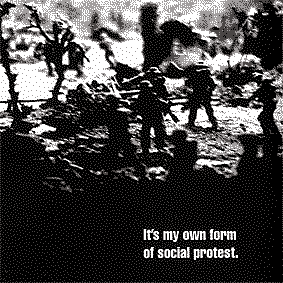
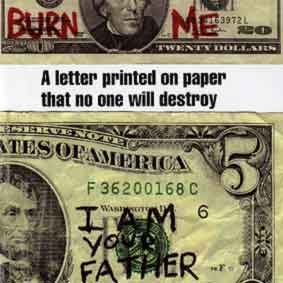
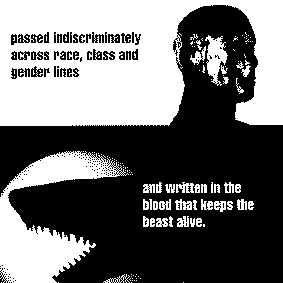
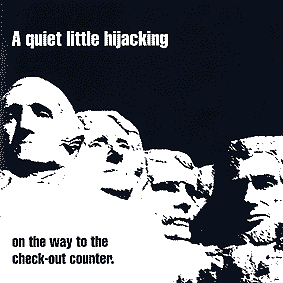


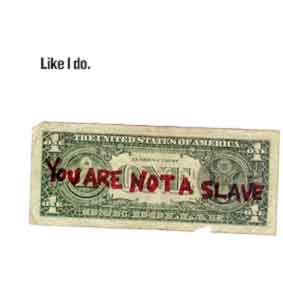 The only question is, if you were going to do this, what would your message be?
The only question is, if you were going to do this, what would your message be?
Posted by Geekery 2 comments
Monday, April 24, 2006
‘There are no terrorists – only people who need Jesus.’
‘If you see them as enemies, how can you reach them? I’ve often said, if you see a terrorist with a gun, get close to him, put your arm around him, and then he can’t shoot you. As long as we see any person – Muslim, Communist, terrorist – as an enemy, then the love of God cannot flow through us to reach them.’
Brother Andrew Light Force
Posted by Geekery 0 comments
Sunday, April 23, 2006
Have you heard of Deir Yassin?
‘Have you heard of Deir Yassin?’ Bishara asked quietly. ‘I’ve heard some vague references to it,’ I said. ‘But I really don’t know much.’
‘In 1948 an entire village, Deir Yassin, was destroyed.’ He pointed towards Jerusalem and said, ‘Just over there, where the suburb of Har Nof is now, two hundred and fifty men, women, children, babies were slaughtered by the Irgun.’ He was referring to the Israeli paramilitary, also known as Haganah, in 1948. ‘This was just three years after the Holocaust. A few men were left alive and driven around to other villages to tell the story; then those men were killed too. The result was panic. That is why so many Palestinians fled. Entire villages were emptied, which is exactly what the Israelis wanted. They just took over those people’s homes.’
From Brother Andrew's Light Force
Posted by Geekery 0 comments
Monday, April 17, 2006
You Stepped Down Into Darkness #2
 This is the verdict: Light has come into the world, but men loved darkness instead of light because their deeds were evil. –John 3:19
This is the verdict: Light has come into the world, but men loved darkness instead of light because their deeds were evil. –John 3:19
Light has come into the world – but at what sacrifice? God displayed the example of great sacrifice when he sent his one and only son, to die in our place.
During lent it’s fashionable for Christians to give up something, but doe we sacrifice anything during our normal weekly existence so that we can worship God?
Posted by Geekery 0 comments
Sunday, April 16, 2006
si·lence n.
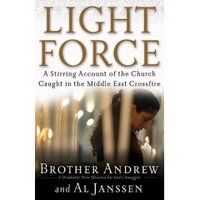 1. The condition or quality of being or keeping still and silent.
1. The condition or quality of being or keeping still and silent.
2. The absence of sound; stillness.
3. A period of time without speech or noise.
Tonight we had a taste of Taize with a focus on silent meditation. This was interesting in light of something I had read earlier in the day from the book, Light Force;
“…they were in all seven of God’s messages (Revelations) to the churches… ‘He who has an ear, let him hear what the Spirit says…’ Did God have our ears, or was it easier to give only our hearts to Jesus?”
It can be hard to hear what God is saying with all the audio pollution that we willingly (and unwillingly) surround our selves with these days, and the Church as a whole doesn’t do anything about it – Can you imagine a large Pentecostal church announcing instead of loud praise and worship they were going to have an hour of silent meditation! It’s not going to happen. Which made tonight’s Taize journey all the more refreshing.
And continuing on the current theme of worship, silent meditation is a good way to worship God – by giving him our ears and listening – intently listening to see what he has to say.
Posted by Geekery 0 comments
You Stepped Down Into Darkness
 In the beginning God created the heavens and the earth. Now the earth was formless and empty, darkness was over the surface of the deep, and the Spirit of God was hovering over the waters. –Genesis 1:1-2
In the beginning God created the heavens and the earth. Now the earth was formless and empty, darkness was over the surface of the deep, and the Spirit of God was hovering over the waters. –Genesis 1:1-2
Darkness isn’t anything. Darkness is defined by light. God stepped down into the darkness and created our world. He bought light to our lives. But he can only bring light to those that welcome it.
Posted by Geekery 0 comments
Saturday, April 15, 2006
Light of the World #2
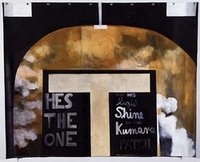 The Lord reigns, let the earth be glad; let the distant shores rejoice… His lightning lights up the world; the earth sees and trembles. The mountains melt like wax before the Lord, before the Lord of all the earth. The heavens proclaim his righteousness, and all the peoples see his glory. –Psalm 97:1, 4-6
The Lord reigns, let the earth be glad; let the distant shores rejoice… His lightning lights up the world; the earth sees and trembles. The mountains melt like wax before the Lord, before the Lord of all the earth. The heavens proclaim his righteousness, and all the peoples see his glory. –Psalm 97:1, 4-6
Nothing lights up the night sky like a lightning storm. Flashes of energy so powerful they can wake you from sleep. But they are nothing compared to the power and energy of the one who created lightning.
Our lives are nothing without the light and power of God. This must be reflected in our worship. And as silly and basic as it may sound, God must be a part of our worship. Do we ever just put on a worship CD because we like the songs, or are we purposefully trying to focus on God?
Don’t get me wrong – I think listening to music because it’s good is ok, but lets not fool ourselves into thinking that just because we’re listening, even singing worship music, that we are worshipping God.
Posted by Geekery 0 comments
Friday, April 14, 2006
Light of the World
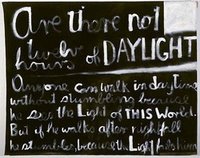 When Jesus spoke again to the people, he said, “I am the light of the world. Whoever follows me will never walk in darkness, but will have the light of life.” -John 8:12
When Jesus spoke again to the people, he said, “I am the light of the world. Whoever follows me will never walk in darkness, but will have the light of life.” -John 8:12
Worship involves following. At church we follow the lead of the worship leader, for the sermon we follow what the paster is saying. But when we leave Church, who do we follow?
We might follow road signs to get home, but in our daily, mundane lives, when we make those little insignificant decisions, who do we follow then? Do we do the leading our selves or do we look to Jesus?
If our whole lives are going to be an act of worship, how do we constantly keep the focus on God?
Posted by Geekery 0 comments
Wednesday, April 12, 2006
Worship ?
 I’ve been thinking about worship a bit recently, Rhett got me started with his comment on an interview with Tree63, and then Christianity Today followed up with a similarly disturbing trend; where they discovered that when talking to artists about the weaker tracks on their new albums, a common reply was, "Oh, that song was added to the album at the last minute. The record label wanted a certain number of worship songs for potential radio play."
I’ve been thinking about worship a bit recently, Rhett got me started with his comment on an interview with Tree63, and then Christianity Today followed up with a similarly disturbing trend; where they discovered that when talking to artists about the weaker tracks on their new albums, a common reply was, "Oh, that song was added to the album at the last minute. The record label wanted a certain number of worship songs for potential radio play."
Ouch. Worship as a commercial commodity?
So what is the state of worship music at the moment? I read an interesting article by John Mortensen about the text or worship.
That combined with having to pick two worship songs for our Cell Group last week, and wanting to do some thing different got me looking at the lyrics and the meaning behind a couple of David Crowder*Band songs.
And then on Sunday Brett spoke on Acts 2:46:
They followed a daily discipline of worship in the Temple followed by meals at home, every meal a celebration, exuberant and joyful.
Whoa. A daily discipline of worship. Cool.
But how?
I think it requires a different focus on what worship is. Sure we worship God on a Sunday by singing. We can listen to worship albums to our hearts content, pretty much wherever we are.
wor·ship (wûrshp) n.
The reverent love and devotion accorded a deity, an idol, or a sacred object.
Love and devotion.
Love is an action, something you consciously do. So to worship daily, or even constantly we must be conscious of all of our decisions. As with a previous post on Sweatshops, worship can be about how we shop, what we buy and how it reflects our devotion to Jesus.
It can be how we spend our spare time, glued to the TV or doing something with a purpose. Sure you can watch TV with a purpose, but you’d have to be selective and purposeful in what you do watch.
Back to Acts 2:46, followed by meals at home, every meal a celebration… Sharing a meal with people, and having the meal as a celebration, a celebration of Jesus, possibly even the meeting, talking and listening to each other – leading to helping with any needs – could this too be a form of worship?
Does this mean we should have people over for dinner on a regular basis, just to worship together in different ways? This would also be a great way of building community, as we start to meet on a more personal level and outside of the Sunday church experience.
Now I’m not hinting at anyone to invite me (and my family) round for a meal, it’s just a concept that has come from my interpretation of the passage. In fact maybe I’ll be inviting you over for dinner some time soon.
But anyway, I mentioned the David Crowder*Band, and I’m gonna leave you with the lyrics of one of his songs and the meaning behind it.
Selah.
Come Awake
Are we left here on our own?
Can you feel when your last breath is gone?
Night is weighing heavy now
Be quiet and wait for a voice that will say
Come awake, from sleep arise
You were dead, become alive
Wake up, wake up, open your eyes
Climb from your grave into the light
Bring us back to life
You are not the only one who feels like the only one
Night soon will be lifted, friend
Just be quiet and wait for a voice that will say
Rise, rise, to life, to life
Shine
Light will shine
Love will rise
Light will shine, shine, shine, shine
He’s shining on us now
Behind the Song:
“I don’t want to leave you,” she said.
“I know,” he said.
“Why? Why must it be this way?” She asked.
“I don’t know, “ he said.
Her eyes closed. They were heavy. And these thoughts were heavy. And she was tired. She wasn’t scared but she was tired. He was tired. His heart was heavy. He was scared.
“I’m so tired,” she said.
“So am I,” he said.
“It will be soon,” she said.
“I know,” he said.
“I’m glad. It will be just in time. I’m just so tired. And the weight is so heavy. In my chest. I’m ready for things to be lighter,' she said.
“I know,” he said.
“I will miss you. I think. I hope. I love it here. But I’m so tired,” she said.
“I know,” he said.
“I’m not scared. It’s not that I’m afraid; it’s just that I don’t want to leave. I mean I do. I want to go to heaven. I’m certain it is beautiful. But I love your face. I just don’t want to die. It sounds so final. And I just don’t want to leave you. I don’t want to leave all of this. I mean I do, some of it, this weight. This pain. These tubes. And that stupid blinking thing that keeps getting lighter and quieter,” she said, her eyes opening, resting on the screen beside her.
He turned to look at the green blips of flat valleys and sharp peaks and wondered how long he’d stared at the monitor in total. He considered that if he were to count the minutes his eyes had rested on her pulse for these months it would add up to more than was comfortable to think about. Hours. Sitting. Watching life. Her life. Blinking from a screen. She was alive. She was here. With him. He remembered the night the peaks stopped for the first time. The long unwavering tone that was the loudest sound he’d ever heard. How it had brought so many people rushing about. All with the hopes to bring the screen back to vivacity. Everyone working furiously. Everyone’s eyes resting on the screen. He knew, when it came, he would stay in that loud unwavering monotone valley for the rest of his existence. He was scared. It was coming. Soon.
“I know,” he said.
“It will be ok,” she said.
“I know,” he said.
Her eyes had moved from the screen to his face. She loved his face. It was full of lines, deep lines that she had watched come, everyone of them. When she had seen him for the first time, so many years ago, his skin was smooth, so smooth for such a hardened boy. But the years had come and left their mark and she had been there for their arrival. She was worn into each of them.
“You know none of us are getting out of here alive,” she said.
“I wonder,” he whispered back...
- David Crowder
Posted by Geekery 3 comments
Tuesday, April 11, 2006
Losing Their Religion
 There’s an interesting article about how American politics have hijacked religion – it’s based around an interview with Jim Wallis who is in Australia promoting his new book God's Politics: Why the American Right Gets It Wrong and the Left Doesn't Get It. It’s quite interesting and has changed my opinion of the book (which I judged by the cover) from one that I wouldn’t touch with a 10ft pole to one that I’d look at if there was one in the damaged bin. My favourite bit of the article is the end where Wallis tells a story of how someone described him; 'You're the only Christian I see and don't throw up afterwards'
There’s an interesting article about how American politics have hijacked religion – it’s based around an interview with Jim Wallis who is in Australia promoting his new book God's Politics: Why the American Right Gets It Wrong and the Left Doesn't Get It. It’s quite interesting and has changed my opinion of the book (which I judged by the cover) from one that I wouldn’t touch with a 10ft pole to one that I’d look at if there was one in the damaged bin. My favourite bit of the article is the end where Wallis tells a story of how someone described him; 'You're the only Christian I see and don't throw up afterwards'
Posted by Geekery 0 comments
Friday, April 07, 2006
Another Day, Another Dollar.
 I found this T-Shirt design online the other day – It made me laugh, and then made me think. They say there’s a little truth in all humour. In this case there’s a lot of truth.
I found this T-Shirt design online the other day – It made me laugh, and then made me think. They say there’s a little truth in all humour. In this case there’s a lot of truth.
Another day, another dollar is an old saying still in use today, but many people in sweatshops and cocoa farms around the world, it’s not a saying; it’s a literal reality.
But I’m not to blame is the easy thing to say. But then I look down and see my Nikes, that I bought real cheap at the Nike store at DressMart. My branded jeans that I got for $10 at DressMart and my $5 T-Shirt from the Wharehouse.
I love a bargain, especially when it comes to items of necessity. But if it’s a bargain, and the shops are still making a profit, and the importer is still making a profit, and the global corporation whose brand I’m wearing is still making a profit, and the factory OWNER, and the people he has to bribe are still making a profit, then just how much do they pay the people who actually made my clothes?
And what about my favourite food, chocolate? My daughter hope had something to say about that in her blog recently.
And it’s a bit of a curly situation really. I know that I can get No Sweat shoes from Trade Aid, the trouble is my Nikes only cost me $40, and that’s all I could afford – getting a pair of No Sweat shoes will cost me $80 - $120 (I’m guessing) – that’s double the price and I have to go to a Trade Aid store – not exactly handy. I wear cheap clothes for a reason; in NZ terms I don’t get paid a lot, so I don’t have much to spend.
Chocolate is a different story. I love the Trade Aid chocolate, and at $2.00 a bar it’s not too badly priced. Trouble is, I normally only buy chocolate when I’m feeling like chocolate, and when I’m feeling like chocolate I’m unlikely to be browsing at a Trade Aid shop.
So what is a Christian to do when it comes to living the Gospel in what we purchase. Can we realistically make a choice that would make Jesus proud? And if we did would it really make a difference?
Are we better off protesting against sweatshops and poor farmers (in our sweatshop produced clothing) and writing to our MP. Should we join a worthy cause, donate money or spend 1 hour a day praying?
What is there that we can realistically do to make a difference?
Posted by Geekery 2 comments
Monday, April 03, 2006
The Last Supper

 Ok, this just tickles my humour, and to give credit where credits due, I discovered it in the latest KidZone magazine, and you can find more like it here.
Ok, this just tickles my humour, and to give credit where credits due, I discovered it in the latest KidZone magazine, and you can find more like it here.
Posted by Geekery 1 comments
Generosity
Last night at church the message was on generosity.
“They sold their possessions and shared the money with those in need.” Acts2:45
“But when you give to someone in need… Give your gifts on private, and your Father, who sees everything, will reward you.”
Generosity is one of those interesting things, ‘cause everyone immediately thinks its all about money. But it’s not. Sure you can and should be generous with your money, but there’s more to it than that. I’m in a position where I have an uncanny ability to get nice Bibles for free (occasionally, not all the time) and this is a nice thing, as it’s cool to get a new Bible, especially one that looks and feels great. But it can become a source of pride.
Recently however, I’ve started giving some of my Bibles away (I still have some spare if anyone needs one), and up to now, I’ve been doing it in private (I’m guessing that blogging about it puts my good deeds in the public arena), and it’s felt really good. It’s amazing how much better a feeling it is to give something away than it is to hoard something you really don’t need.
But I’m getting off on a tangent. Money, possessions and even time are all forms of possible generosity.
But how do you become generous? I’ve found it’s easiest to be aware e of what’s going on around you – it’s easy to ignore needs, but if you start paying attention to what’s going on around you, you might find ways everyday where you can be generous with your money, possessions, time or something else.
And I think generosity breed’s generosity. The more you respond to situations with your generosity, the more situations you’re likely to see. And it’s funny how generosity is often rewarded by generosity.
Now I have no problem with generosity, I’ve found a few different situations recently where I’ve been able to be generous in various ways. And I prefer to be quietly generous - I don’t really like to be the centre of attention (that’s why I love blogging!). The trouble is sometimes my mind has different ideas.
I found myself sitting in church thinking about what was being said about generosity, when my mind began to wander to my recent acts of generosity, and I began to think how nice it would be to get just a little praise for my action. Some sort of recognition for my deeds.
That’s as far as I ever get, ‘cause I really don’t want to have recognition for specific acts – sure I’d love to be known as a generous person – doesn’t everyone? But it causes me some frustration, as I don’t know why my mind gets away from me. But I guess it’s all a part of the journey, and possibly a way to keep pride at bay. If I have this battle going on in my mind, it helps keep me in check, keeps me from bragging about my deeds.
So what’s the point of this post? I don’t really know, I started out thinking I knew what I was going to say, and it sounded pretty good in my head, but ended up being more of a waffling semi self righteous promotion of my own generous self.
Posted by Geekery 0 comments
Saturday, April 01, 2006
Anselm of Canterbury
Frank came up with a suggestion that got me interested. Yeah, I know what y’all saying; “How could Frank come up with something interesting?” But he did an internet test on What Theologian Are You? And published his results. I decided to do the same and discovered I was Anselm.
Who is Anselm I thought? Frank suggested I do a search online and find out about him, and all the other great theologians on offer – so I am, and I’m starting with Anselm, of course!
Although born at Aosta in Alpine Italy and educated in Normandy, Anselm became a Benedictine monk, teacher, and abbot at Bec and continued his ecclesiastical career in England. Having been appointed the second Norman archbishop of Canterbury in 1093, Anselm secured the Westminster Agreement of 1107, guaranteeing the (partial) independence of the church from the civil state.
In a series of short works such as De Libertate Arbitrii (On Free Will), De Casu Diaboli (The Fall of the Devil), and the lengthier dialogue Cur Deus Homo (Why God became Man), Anselm propounded a satisfaction theory of the atonement, upon which the incarnation promises relief from the strict demands of divine justice. He defended a notion of the relation between philosophy and theology that, like Augustine's, emphasized the methodological priority of faith over reason, since truth is to be achieved only through "fides quaerens intellectum" ("faith seeking understanding"). Anselm's combination of Christianity, neoplatonic metaphysics, and Aristotelean logic in the form of dialectical question-and-answer was an important influence in the development scholasticism during the next several centuries.
Hhhmmm, I think I’m gonna have to do some more research before making any serious comment – hey, I might even learn something and become less of a heretic…
Posted by Geekery 0 comments


